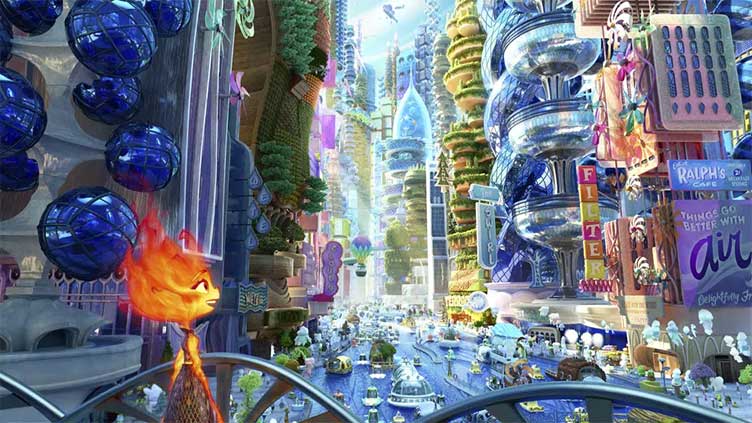Makers of 'Elemental' explore family, tolerance and movement

Entertainment
Makers of ‘Elemental’ explore family, tolerance and movement
MEXICO CITY (Web Desk) — “Elemental” director Peter Sohn says his parents ignited the spark for the upcoming Disney and Pixar animated film.
Sohn invited his parents — who both had emigrated from Korea to the U.S. — to an event. Seeing them from the stage filled him with a deep appreciation for all they had done for their family.
“I saw them, and I was very emotional thanking them for all the sacrifices,” Sohn said in a recent video call interview for “Elemental,” a film about a family of fire elements who migrate to Element City, a place where there are also inhabitants of water, air and earth. The themes of family, tolerance and building connections run throughout the film debuting this summer.
The film centers on Ember, a fire element who loves working at her father’s store but has trouble controlling her explosive temper, especially around uncomfortable customers.
Ember’s life in Firetown, a suburb with many inhabitants of fire, is turned upside down when, due to a plumbing accident, she meets Wade, a water element and inspector who lives in Element City. Ember and Wade get to know each other, and she enjoys being outside Firetown. They realize their differences — and elements — are not an impediment for friendship.
The production team faced a challenge in bringing the characters to life.
“We have been doing all sorts of different characters, from toys to cars... And that was another challenge,” said Spanish animator Jordi Onate. “We had to break all the rules that we knew from body mechanics...We did a lot of research on how the water behaves and how the fire behaves in certain situations and, on top of that, trying to make them talk.”
But the fact that they are elements also gave animators the ability to give the characters particular powers. For example, Ember’s a girl of fire. She can use that fire to remake broken glass and weld metal.
“This is one of the most complex projects I think we’ve worked on at Pixar, just because of that; we are used to animating humans or animals, and you have references for that, but in this case, we were trying to figure out how a character made of fire or water would move,” said Colombian animator Luis Uribe Córdoba. “We had like three or four weeks just to test out stuff and watch videos of slow-motion fire or water behavior.”
Development of the project began seven years ago. Mexican artist Paula Assadourian was one of the first to help Sohn find the essence of the characters and story. Assadourian, who began working on the film in 2019, was in charge of making the story board before production.
“I think “Elemental” is a very special film because it’s about Ember kind of coming to face (with) who she is and what she wants to do; if she wants to pursue her path or if she wants to kind of stay close to her roots and her family and what people expect her to be,” said Assadourian.
“Wade changes Ember, or he kind of awakens her to say, ‘there’s so much more you can do with your life.’”
Sohn, who in addition to being a director is an animator, voice actor and artist, previously directed “The Good Dinosaur” and has collaborated on multiple Pixar films such as “Incredibles 2,” “Ratatouille,” “Finding Nemo,” “Up,” “Toy Story 3” and “WALL E.” But “Elemental” is the most personal story in which he has been involved.
The film shows that tolerance and empathy can combat evils such as xenophobia. Sohn says the “idea of xenophobia″ was a part of ”Elemental″ from the start.
“The idea of xenophobia was always in the story from the beginning (before the pandemic),” he said.
“Because my father and mother experienced the same xenophobia, it wasn’t a new thing…(But) the idea of Asian hate that started happening in such boldface manners was really terrifying. I remember my mom calling me and saying don´t go out into San Francisco. She was terrified, and she had never been terrified to that level when we were growing up; it was a real fear.”
The film’s layers drew producer Denise Ream to collaborate with Sohn from the beginning of the project.
“The story had layers to it that I really appreciated, I just connected to it with the idea of thanking your parents, it really resonated a lot with me,” she said. “I really was excited about the visual and technical challenges, that really got me fired up. I knew (it) would be hard — it turned out to be a lot...harder than I thought it would be — but I like everything about it.”

